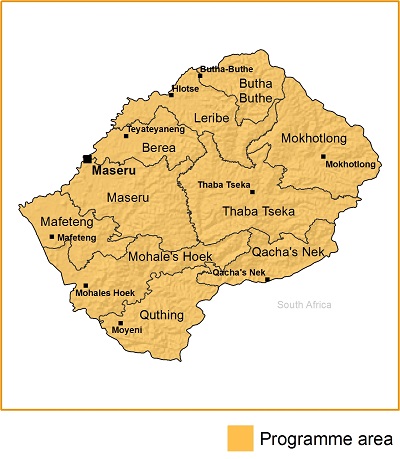Rural Financial Intermediation Programme
IFAD Asset Request Portlet
Publicador de contenidos
Rural Financial Intermediation Programme
Rural Financial Intermediation Programme
The objective of the programme is to enable poor rural people to access financial services that respond to their specific needs. In Lesotho, most people do not have access to a broad range of financial services such as savings, credit, money transfer and insurance. As a result, most rural households depend on informal local groups and moneylenders. In case of need, poor rural people have few options other than borrowing money from informal local groups, relatives and moneylenders, often at exorbitant rates. As a consequence, they tend to borrow only in emergency situations and are unlikely to seek loans to develop businesses or invest in their farms. The physical distances separating them from financial institutions, and unfavourable terms and conditions such as minimum balance requirements and fees for depositing money, also make it difficult for poor rural people to access reliable and secure saving facilities.
The Rural Financial Intermediation Programme will improve access to financial services by developing member-based institutions, extending the outreach of formal networks and creating linkages with informal institutions. Among the grass-roots level member-based institutions that it will support are financial cooperatives and rural savings and credit groups, and other types of informal groups. As a formal financial institution, the Lesotho PostBank is expected to be a key player. The programme will help transform the PostBank into a professionally managed institution operating on business principles while at the same time maintaining its social mandate. In collaboration with other partners, the programme will also support the government in developing regulations and policies to encourage efficient and sustainable financial services and to promote competition.
Poor households with the capacity and opportunity for engaging in income-generating activities will be the first to benefit from the programme, through improved investment in productive activities and enhanced savings accumulation. Sources of potential income include marketable surpluses from agricultural or livestock activities, remittances and occasional employment. Very poor people with low incomes will also benefit because they, too, will be able to gradually accumulate savings and have access to a secure place in which to deposit their savings, however small they may be.
The programme is coordinated under the Ministry of Finance and Development Planning and the key implementing partners are the Central Bank of Lesotho, the Lesotho PostBank and the Department of Cooperatives of the Ministry of Trade and Industry, Cooperatives and Marketing.
Source: IFAD
